Classic Comeback - Games of 2011 | Football Manager 2012 and My 10 Years Not Kicking The Ball Around
Manchester City and German international midfielder Ilkay Gündogan confessed in a recent interview that he is ‘ashamed of his long Football Manager sessions’, and unfortunately this is not a phenomenon unique to professional footballers. It is a feeling most Football Manager players have encountered at some point – a reflective repulsion of sorts, wondering how you let a game that amounts mostly to spreadsheets and emails take over your life so authoritatively. It just doesn’t make sense until you play it yourself. Even during the inevitable breaks you salvage from the game you’ll struggle to fathom the hold it has taken over you. Then the moment you return again it all comes flooding back...
Editor’s note: when Harry submitted this piece to he bet me I couldn’t find an exciting screenshot of the game. This is the first image that came up when I Google “Football Manager 12 exciting screenshot”.
I’d been a FIFA player all my life, from picking up the Thierry Henry emblazoned FIFA Football 2002 for 50p from my local Gamestation to pre-ordering FIFA 12 exactly one decade ago. Yet, it is not FIFA 12 that has left a lasting impression upon me but another game I picked up in 2011: Football Manager 2012. It was my first foray into the famous series, and the birth of an obsession that would run adjacent to my own life for the next ten years. I remember downloading the demo - which I believe only allowed you to play half a season – and reaching the limit within a day or so. It was such a contradictory feeling: I was absolutely hooked, but I had no clue what on earth I was doing.
In preparation for this piece, I redownloaded the game just to see what it would look like for a complete beginner and, frankly, I am shocked I was bothered enough to make it past the title screen alone! You are indeed greeted by a “Welcome to FM” mini-screen, but I don’t think the most inviting welcome message could make up for the bombardment of numbers, names, dates and all twenty-nine (yes I did count) different guide entries. In theory, it should be simple – and in practice it almost is – but there is so much going on at once from the start it is easy to get lost within the fog of information. Yet, I persevered, and quickly realised there is little you necessarily need to do beyond setting up initial tactics and occasionally pressing the continue button. And it is within this simplicity that lies Football Manager’s addicting qualities. Much in the same way that games like Civilisation thrive upon the ‘just one more turn’ mentality, Football Manager ignites our desire for just ‘one more match’.
Some people may call FM dry, but honestly there is something pretty satisfying about watching these dots move around.
But it's not just the matches, is it? It’s the transfers, the press conferences, the tactics adjustments, and even the emails. It is like having the momentary thrill one gets upon receiving a notification on their phone accessible every time you press a continue button. You persevere under the clear knowledge that there is always going to be another email in your inbox, and you are always going to be one day closer to the next ‘event’, whether that be a match or transfer deadline day. It’s inevitable that the games we play the most are the ones that exist outside of the confines of finite stories and characters, but I’ve never before played a game that perpetuates permeance quite like Football Manager. Getting bored of your club? Resign and get a new job. Getting bored of yourself even? Retire and birth a new manager to take over your reigns! It is a game designed to be endless, constrained only by your own slowly withering attention span.
If you like Destiny, you’ll love Football Manager. THERE IS WAY MORE STATS AND THEY KEEP GOING UP (and sometimes down).
I began FM12 in both the right and the wrong way: with Real Madrid. In terms of the good, I had access to a large transfer budget to grant freedom in exploring the market and an outstanding squad with wide tactical flexibility to ensure that my beginner tactics couldn’t go too wrong. This is fantastic for a beginning player, as it removes the roadblocks one might encounter with a less-accomplished club, allowing you to grasp all the games systems quickly and easily, but it is not what the game is really about. Very few people play Football Manager to play as a team like Real Madrid, and I certainly haven’t spent the last ten years restarting saves to play as a super-team. The reason why I keep coming back, year after year, to play a game I feel I should be exhausted with at this point is because I’m constantly finding new challenges within the game. In the same way that people play through the Souls games taking no hits or with play the Donkey Kong Bongos, playing with lesser teams is a way to induce challenge – and freshness – into a largely repetitive formula. Why win the Champions League with Bayern Munich when you can take Stirling Albion from the Scottish 4th Division and win it with them? And why inherit a team already full of superstars when you can carefully and slowly build one of your own? Football Manager lets you create an underdog story so wild most movie execs would baulk at it.
What has always been one of the most intriguing aspects of the Football Manager games for me is the franchise’s ability to act as a time machine of sorts. The obvious progression of time with each game gives a projection of the future – an insight into football’s future stars and dominant clubs in years to come – but it is perhaps more interesting to look back in time and revisit old titles to see where your current favourite players are now, and how correct the game was. It is fascinating to see who Football Manager 12 thought would be the next big star. It is perhaps just as interesting to see players flourish adjacently in real life and in-game as it is to see simulation superstars wither away in their actual careers.
I recently reinstalled FM12 for this very reason; an investigation into the footballing world of ten years ago. Immediately I found some alien concepts: a Liverpool transfer budget of £7.5m (which would barely buy you a decent player now), and the recently transferred (and soon to be flop) Fernando Torres valued at nearly twice the price of greatest-player-ever Lionel Messi. Whilst humorous to me now, it set off a spark within me. The game – despite its relative success in telling the future, cannot foresee all and remains firmly within the zeitgeist of the 2012 footballing world. What then, would it be like to play it with the knowledge I have today? Would it wield a vastly different experience to when I played it a decade ago, and would things play out differently? That’s where Football Manager exceeds for me: within the cracks of time, granting each player the chance to rewrite history of sorts, critically detached and different from any other reality. And here I am, hooked again.
Go Gunners!
(that’s their name right? can you tell I don’t watch soccer?)
I have played various Football Manager games both relentlessly and sporadically over the past couple of years, with a collective hour total far too embarrassingly large to confess here, yet I wouldn’t even think to call any of them my favourite games. When I think of 2011 in gaming I think of Dark Souls, Deus Ex: Human Revolution, and Skyrim, not FM12, but I cannot deny the impact it has invariably had on my past ten years in gaming. I think of Football Manager as an itch I can never quite scratch; just as I think it has gone away I think of a new team, a new challenge, a new adventure to embark upon, and suddenly I am back again. I accept that I will probably get bored eventually, but I don’t think I will ever stop playing Football Manager, and what better way to celebrate 2011 than the game that started it all for me.










